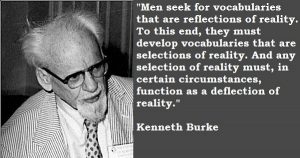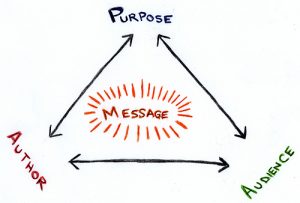Dr. Hazel Elif Guler on Oct 14th 2016 Rhetoric

Due by the class period on Monday, October 17th
On Monday, October 17th, we’ll discuss Burke’s essay, “The Rhetoric of Hitler’s Battle” (191-220 in Philosophy of Literary Form). Here are your blogging prompts on this essay:
1) At the beginning of his essay, Burke states: “The appearance of Mein Kampf in unexpurgated translation has called forth far too many vandalistic comments. There are other ways of burning books than on the pyre–and the favorite method of the hasty reviewer is to deprive himself and his readers by inattention. I maintain that it is thoroughly vandalistic for the reviewer to content himself with the mere inflicting of a few symbolic wounds upon this book and its author, of an intensity varying with the resources of the reviewer and the time at his disposal” (191). What is Burke’s claim here? What are the implications of this claim?
2) Burke provides a list of features that explain Hitler’s rhetorical “unification” device. List those features, and give an example of how each is evident in Hitler’s rhetoric.
3) Which (if any) of Burke’s list of unification devices are currently being used by any of the candidates in the ongoing presidential campaign (for example, at the second presidential debate)? Mark those ideas in your hard copy of the essay and take a note about them in your blog. If possible, incorporate a link or a video to your posting exemplifying the use of the rhetorical device. Be ready to share your ideas during our discussion on Monday.
Dr. Hazel Elif Guler on Oct 9th 2016 Rhetoric
Due by the class period on Wednesday, October 12th

Rhetorical Triangle. Creative Commons Image posted on Flickr by Ted Major.
For this posting, state your conference paper topic and include at least two sources you can use for your project (primary or secondary sources). The questions your posting should answer:
1) What is the cross-national text discussed (or to be discussed) this semester that you want to use as a springboard to examine the rhetoric of a selected issue? What is the issue that you will focus on? (The text will provide the inspiration for your selection of an issue and will serve as an example of an effective rhetoric on the issue. You will first want to identify some textual evidence, such as quotes from Trudeau’s speeches, to illustrate his effective rhetoric: for example, his efforts to address diversity in the Canadian nation through his celebratory messages published on his social media sites.)
2) Which figure from the 2016 US presidential race will you focus on (whose rhetoric will you analyze) in your conference paper? It’s possible to choose a single figure or more than one figures, which may be one of the presidential or vice presidential candidates, their prominent supporters such as their party members or the previously elected presidents, first ladies, etc. This list can even include celebrities who spoke about the selected issue as part of the presidential race, for example, at an RNC or a DNC gathering. (You will then look at the rhetoric of an issue such as “diversity” within the discourse of your selected affiliate with the 2016 presidential race: e.g., Donald Trump’s discourse about diversity. Your ultimate goal with your essay will be either to promote your selected rhetor’s effective discourse about an issue or lay out the problems with the discourse and make suggestions for improving the rhetoric to better address certain individuals or groups’ issues and rights. Contact me if you need to discuss ideas.)
3) What will be your primary and secondary sources for this exploration? Include at least two specific examples with a brief description of each source.
Dr. Hazel Elif Guler on Oct 7th 2016 Rhetoric
Our class members did a great job with sharing their post-debate reflections at The Office of International Affairs First Thursdays Event, “An Effective Rhetoric for Global Peace and Understanding: Students’ Insights for Presidential Candidates,” on October 6, 2016.
Some excerpts from the insights shared with Longwood students:
“Rhetoric refers to the purposeful use of language and the classic art of making effective arguments. Plato suggested that rhetoric should be used to find the truth and achieve justice. Aristotle defined it as the use of the available means of persuasion. Quintilian said only good and virtuous men should practice the art of rhetoric. Various other key figures across cultures and nations also studied rhetoric and offered their own definitions and interpretations of this art.”
“The presidential candidates seem to make various arguments. The question is: are these effective arguments?”
“Jay Heinrichs, a persuasion guru who has applied rhetorical principles, from business transactions to family quarrels, observes that ‘We need to distinguish rhetorical argument from the blame-shifting, he-said-she-said squabbling that defines conflict today. In a fight, each disputant tries to win. In an argument, they try to win over an audience’ (Thank You for Arguing).”
“Albert Einstein once said: ‘The world is a dangerous place, not because of those who do evil, but because of those who look on and do nothing.’ We concur with this statement, but we also contend that the world is a dangerous place because of those who say nothing or say the wrong thing. We hope that our presidential candidates work to achieve global peace and understanding by awakening the idea that it all begins with their use of language. Rhetoric is more than a tool of persuasion–it is the fundamental difference between conflict and progressive argument.”
Well done, ENGL 305: Rhetoric and Public Culture students!





